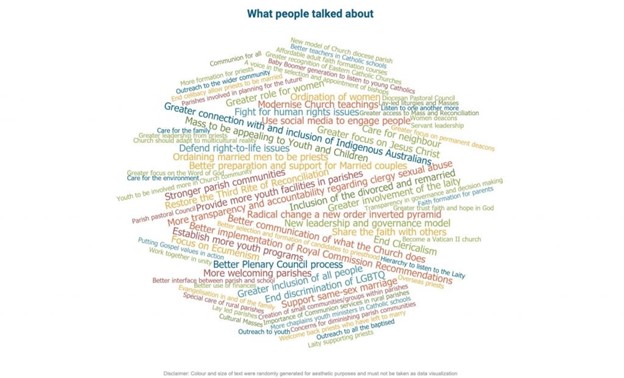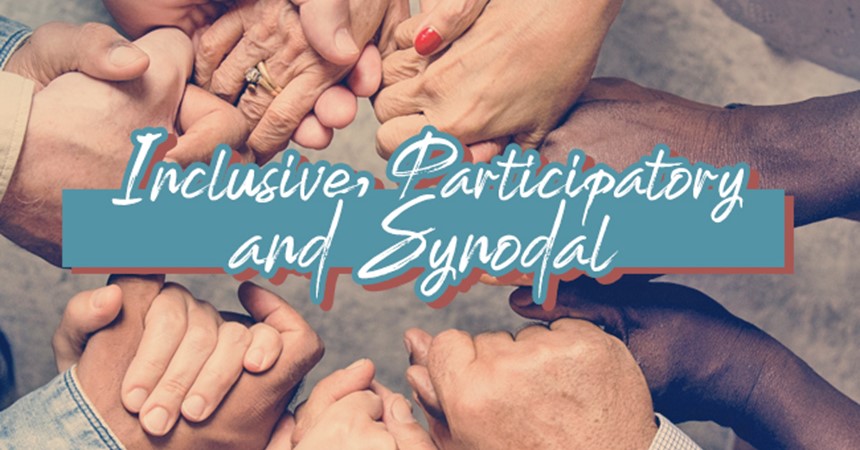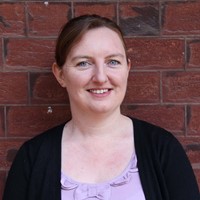The fruits of what is discerned during this time will help shape the agenda of the first session of Plenary Council in October 2020.
Each week, a snapshot report will be released by the Plenary Council Facilitation Team, showing the responses that lead to the development of each theme.
The second snapshot report centres on:
How is God calling us to be a Christ-centred Church that is Inclusive, Participatory and Synodal?
This National Theme for Discernment is inspired by the voices of the People of God who expressed a desire for individuals and groups within and also beyond the Church to find a better welcome and be incorporated more into her life and mission. There was a call to renew forms of governance and leadership in the Church, to find ways formally and informally of being co-responsible for ministry and mission, seeking structures and processes of collaboration, shared decision-making and financial co-responsibility in order to enable this greater involvement of lay people particularly of women, young people, people of diverse cultural backgrounds and people with disabilities. There was an expressed need for stronger connections across the many parts of the Church, and with other Christian traditions.
Topics: what did people talk about?
People spoke about a number of different topics in phase 1: listening & dialogue. A comprehensive report on all the voices of participants will be released on July 28, 2019.
Below are some of the topics that informed this particular theme, which was created through a combination of analysis, discernment and prayer.

DISCLAIMER: Colour and size of text were randomly generated for aesthetic purposes and must not be taken as data visualization. Image: Plenary Council 2020.
Below is a snapshot of responses to the question: What do you think God is asking of us in Australia at this time?
“To build a compassionate, welcoming, inclusive and courageous community where we come together to better understand Gospel values, how to live them and put them into practice — strengthened by ritual prayer so as to be open to the guidance of the Holy Spirit”.
“To reintroduce and promote the Third Rite of Reconciliation so as to encourage more parishioners to participate in the sacrament, as neither the First or Second Rites are attracting many parishioners.”
“God is asking us as a whole ‘Come back to me with all your hearts’. There is not enough passion and commitment in us Catholics following the teachings given to us in the Bible by Jesus (and even the prophets in the Old Testament) and God wants to invite all of us young and old back into relationship with Him to know Him as He truly is, to love Him with heart, soul and mind, and to serve (to give without counting the cost) only Him”.
“God is calling the teachers in schools and the laity to be better educated in the faith to then be able to pass on the faith to children. The laity need to be taught how to encourage children and lapsed Catholics to practise their faith”.
“Women need to be equal and their presence in all Church governance needs to be equal to the male presence. Women shouldn’t only be able to be acolytes but also deacons and, yes, priests. There’s a whole hurting humanity because some people don’t want to go to a male priest for reconciliation. We are all Christ bearers”.
“I have been a teacher for nearly 30 years in the same Catholic Secondary College … I have personally suffered much persecution for my Catholic/Christian beliefs at school. There have been and are teachers who openly criticize students who have a faith and practice it, live it out, speak up about social issues that plague Australian society. It seems it is okay to have a social/moral stand on poverty, homelessness and other social issues affecting Australia but you cannot speak up about sex before marriage, homosexuality etc. … Teachers like myself are few in number and many keep silent so as to not be found out for fear of reprisals”.
“To be compassionate to the marginalised. To be outspoken about injustice in all its forms. To be inclusive to all, irrespective of sexual disposition or marital status. To modernise with the times”.
“While lay involvement is getting better and the Church does listen, I would love to see a Church that involves the laity more [and] gives more of a scope for the laity to participate in the management of the Church”.
Here is a snapshot of responses to the question: What questions do you have about the future of Australia that you would like the Plenary Council to consider?
“Our parish clergy are overworked, stressed and stretched beyond reasonable limits. Moving beyond strategies of parish amalgamation and closure, what other options will we explore? By that I mean the non-ordained’s role in making pastoral decisions?”
“How does the Church law allow for inclusion of all peoples? Do we need to adapt these laws to a changing world?”
“Why has the hierarchy failed to publicise the good works undertaken by our schools, hospitals, refugee support, etc?”
“How can a more synodal approach to leadership in the Church at parish and diocesan levels be exercised as a shared responsibility, by virtue of Baptism, between both lay and clergy?”
“How is the Church able to respond to the diversity of our community to be inclusive of all – Indigenous/First Nations, environmental protection, gay rights?”
“How can we better nourish and support the spiritual life of adult lay people?”
This is a snapshot of your stories of faith
Dennis, Sydney
I have found being part of a ministry quite rewarding. I currently hold [a] position … [on a] parish pastoral council. The role can be time-consuming but very rewarding at the same time. For a long time, I was a parishioner who would attend Mass and that was it. My parish priest asked me to serve on the council and I am pleased to make my individual contribution to the parish. Further to that, I feel that I am serving God.
Jenni, Perth
My husband’s and my faith in the Catholic Church has been sorely tested since a new priest came to our parish. We tried to work with him in many ways and on many levels, but he was not open to growth or advice from others. We have come out of this experience with an even stronger connection to Jesus/God/the Spirit and each other, but are very disappointed not only in the way this priest operated but how our concerns were handled by some members of the hierarchy.
Jessica, Melbourne
From the ages 15 to 20, I attended a young adult faith formation group through my parish. It taught the Church’s teaching on moral and ethical issues, it also covered explanations on the Mass. Guest speakers were invited and it was well attended. I am ever grateful for this formative opportunity, given to me through the generosity of young, faithful, passionate lay Catholics. This adult formation set me up for life; I still recall the basic principles I learnt 15 years ago on absolute truth, transubstantiation and ethics relating to abortions and euthanasia.
More information on the National Themes for Discernment can be found on the Plenary Council website: www.plenarycouncil.catholic.org.au
With thanks to the Plenary Council.

